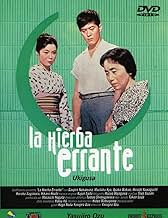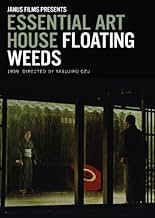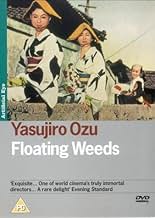IMDb-BEWERTUNG
7,9/10
9534
IHRE BEWERTUNG
Füge eine Handlung in deiner Sprache hinzuThe head of a Japanese theatre troupe returns to a small coastal town where he left a son who thinks he is his uncle, and tries to make up for the lost time, but his current mistress grows j... Alles lesenThe head of a Japanese theatre troupe returns to a small coastal town where he left a son who thinks he is his uncle, and tries to make up for the lost time, but his current mistress grows jealous.The head of a Japanese theatre troupe returns to a small coastal town where he left a son who thinks he is his uncle, and tries to make up for the lost time, but his current mistress grows jealous.
- Regie
- Drehbuch
- Hauptbesetzung
Empfohlene Bewertungen
Ozu is a wonderful experience just to watch the musical formations. Each shot is composed in the most careful way so that the assembly has a geometric rhythm. It is soft and melodic, this visual overlay, painting in motion. No one does it better that I know.
There's a talk between two troubled lovers in the rain, then in opposing shelters, that is especially noteworthy, but it is all so cinematically lovely...
The way he's put this together is very Japanese. Each shot length is nearly precisely the length of the one before. Each employs a stationary camera only, but the positioning of the camera only sometimes is where a human eye would be. As I've mentioned, The composition in terms of elements, space and color is perfect in each shot and follows in a deliberate, engineered pattern from the previous shots.
The narrative isn't integrated in the way Kurosawa would do — and be considered un-Japanese for. But the story does much of that for us.
It is a story about pretense and staging, with most of the actors playing characters who are actors and have trouble in being an actor.
You'll have to work to be engaged in the story. But its rather easy to just sit back and admire the loveliness. Ozu is always worth it for this. I don't know many of his films, but this is the most formal of those I know.
Ted's Evaluation -- 3 of 3: Worth watching.
There's a talk between two troubled lovers in the rain, then in opposing shelters, that is especially noteworthy, but it is all so cinematically lovely...
The way he's put this together is very Japanese. Each shot length is nearly precisely the length of the one before. Each employs a stationary camera only, but the positioning of the camera only sometimes is where a human eye would be. As I've mentioned, The composition in terms of elements, space and color is perfect in each shot and follows in a deliberate, engineered pattern from the previous shots.
The narrative isn't integrated in the way Kurosawa would do — and be considered un-Japanese for. But the story does much of that for us.
It is a story about pretense and staging, with most of the actors playing characters who are actors and have trouble in being an actor.
You'll have to work to be engaged in the story. But its rather easy to just sit back and admire the loveliness. Ozu is always worth it for this. I don't know many of his films, but this is the most formal of those I know.
Ted's Evaluation -- 3 of 3: Worth watching.
Floating Weeds by Yasujiro Ozu is an exquisitely restrained film about a failing acting troupe that travels to a small town and engenders a conflict of generations in a Japanese family. As the film opens a boat moves slowly into the harbor a Japanese coastal village. A Kabuki troupe arrives and begins to pass out leaflets announcing their opening performance. Sadly the opening crowds are small. Komajuro (Ganjiro Nakamura), the principal actor in the troupe, goes off by himself to visit Oyoshi (Haruko Sugimura), a former lover who runs a Saki bar. She has an adult son, Kiyoshi (Hiroshi Kawaguchi) who Komajuro had fathered many years ago. Komajuro has hidden his identity from the boy because of his shame at being a traveling actor and Kiyoshi only knows of him only as "uncle".
When Sumiko (Machiko Kyo), Komajuro's mistress and leading star, finds out about this relationship she goes into a jealous rage and hires a young actress, Kayo (Ayako Wakao) to seduce Kiyoshi in order to humiliate his father. Kiyoshi, however, falls in love with Kayo. Komajuro disapproves and shows his anger but cannot exert parental authority since he has not told his son the truth about his parentage. As the troupe continues to draw small crowds, Komajuro's inner pain becomes visible and he strikes out physically against Kayo, Sumiko, and Kiyoshi. It is only in the surprising conclusion that he seems to regain some sense of acceptance of his circumstances.
Floating Weeds is a very intimate experience. The camera does not move but remains focused on the characters as they engage in discussions about commonplace events. As in Bresson, the actors show little emotion and speak in a monotone with long silences between questions and answers. The overall effect, however, is not banality but a sense of the natural rhythm of life. Ozu is a loving observer of human nature not a moralist. There are no saints in this film and each character is vulnerable and deeply human. Komajuro has been stripped of his career, his relationship with his son, and his female companions who still beg him for forgiveness. He is alone but he has retained his humanity and we feel only compassion for him. The ending is, in the phrase of Donald Richie, "a kind of resigned sadness, a calm and knowing serenity which maintains despite the uncertainty of life and things of this world". Floating Weeds is a masterful film from a director who truly respects his audience.
When Sumiko (Machiko Kyo), Komajuro's mistress and leading star, finds out about this relationship she goes into a jealous rage and hires a young actress, Kayo (Ayako Wakao) to seduce Kiyoshi in order to humiliate his father. Kiyoshi, however, falls in love with Kayo. Komajuro disapproves and shows his anger but cannot exert parental authority since he has not told his son the truth about his parentage. As the troupe continues to draw small crowds, Komajuro's inner pain becomes visible and he strikes out physically against Kayo, Sumiko, and Kiyoshi. It is only in the surprising conclusion that he seems to regain some sense of acceptance of his circumstances.
Floating Weeds is a very intimate experience. The camera does not move but remains focused on the characters as they engage in discussions about commonplace events. As in Bresson, the actors show little emotion and speak in a monotone with long silences between questions and answers. The overall effect, however, is not banality but a sense of the natural rhythm of life. Ozu is a loving observer of human nature not a moralist. There are no saints in this film and each character is vulnerable and deeply human. Komajuro has been stripped of his career, his relationship with his son, and his female companions who still beg him for forgiveness. He is alone but he has retained his humanity and we feel only compassion for him. The ending is, in the phrase of Donald Richie, "a kind of resigned sadness, a calm and knowing serenity which maintains despite the uncertainty of life and things of this world". Floating Weeds is a masterful film from a director who truly respects his audience.
While seemingly rather simple, "Floating Weeds" is quite a satisfying film that combines Ozu's usual thoughtful tone with characters and atmosphere convincing enough that they almost immediately make you feel as if you know both the principals and their surroundings. Much of the running time is spent on apparently routine activities, but each scene serves a useful purpose in developing the themes, settings, and characters.
The story ties together the fortunes of a traveling troupe of kabuki actors with, in the forefront, a crucial point in the relationships of Komajuro, their leader. The setting in a seaside village offers a suitably languid atmosphere that sets off both plot lines very appropriately. One of the things that is so interesting about Ozu's films is that the settings are so definitively Japanese, with plenty of well-conceived details, and yet the way that he approaches the story and characters makes his movies seem universal, confined neither by time nor place.
The characters here are an interesting assortment of theatrical types and villagers. Many of them are relatively one-dimensional, but they are portrayed with skill and sensitivity, making even the simplest of them seem worth knowing. Especially good is Machiko Kyô as Sumiko, who is also the most interesting of the characters. Ganjiro Nakamura is good too as Komajuro, but Kyô usually gets the best of their scenes together.
Two particularly good scenes between the two are the tense dispute in the rain and the encounter in the train station. In the former scene, Ozu's setup for the scene is a perfect complement for the characters' dialogue and actions. In the latter, the characters convey deep feelings with the most economical and satisfying of means.
This is the kind of movie for which subsequent viewings might even be more enjoyable than the first, in the way that coming back to a familiar place can give you an odd sense of peace or security. And it leaves you with the feeling that it would be nice to come back again sometime.
The story ties together the fortunes of a traveling troupe of kabuki actors with, in the forefront, a crucial point in the relationships of Komajuro, their leader. The setting in a seaside village offers a suitably languid atmosphere that sets off both plot lines very appropriately. One of the things that is so interesting about Ozu's films is that the settings are so definitively Japanese, with plenty of well-conceived details, and yet the way that he approaches the story and characters makes his movies seem universal, confined neither by time nor place.
The characters here are an interesting assortment of theatrical types and villagers. Many of them are relatively one-dimensional, but they are portrayed with skill and sensitivity, making even the simplest of them seem worth knowing. Especially good is Machiko Kyô as Sumiko, who is also the most interesting of the characters. Ganjiro Nakamura is good too as Komajuro, but Kyô usually gets the best of their scenes together.
Two particularly good scenes between the two are the tense dispute in the rain and the encounter in the train station. In the former scene, Ozu's setup for the scene is a perfect complement for the characters' dialogue and actions. In the latter, the characters convey deep feelings with the most economical and satisfying of means.
This is the kind of movie for which subsequent viewings might even be more enjoyable than the first, in the way that coming back to a familiar place can give you an odd sense of peace or security. And it leaves you with the feeling that it would be nice to come back again sometime.
This, one of Ozu's last films, has all the elements of a Shakespearean tragedy played out among people living simple, workaday lives: deceit, jealousy, betrayal, vengeance, love, hope. It's all there. The acting by an all-star cast (at the time) of Japanese actors, including the gorgeous Ayako Wakao, is uniformly excellent. The cinematography may be the best I've seen for any color film made in the 1950's. The overall pace was a bit too slow for my liking, but it works well with a static camera taking every shot below eye level. This gives the viewer a visual perspective similar to looking at the actors on a slightly elevated stage, just as the audience does when watching the plays put on by the itinerant group of actors that centers the film. Overall, a well-crafted work by a recognized master, but not for the 'explosions & car chase' crowd. Rating: 8/10
An itinerant troupe of Kabuki players bring their shows to the small town in which their leader Komajuro (Nakamura Ganjiro II) sired a son (Kiyoshi, Hiroshi Kawaguchi) from whom he has hidden his parentage. This beautifully made film is Yasujiro Ozu's 'remake' of his 1934 silent (A Story of Floating Weeds). Like all of Ozu's films, little happens as his static camera catches vignettes of the various shabby players as they try to hustle up an audience for their dated show, hit on the local girls (in several amusing scenes), and drink. Much of the story is about Komajuro's reconnecting with Oyoshi (Haruko Sugimura), the mother of his son and the jealous reactions of Sumiko, Machiko Kyo, his current mistress. Like all of Ozu's films, the drifting apart of generations is a focus as Komajuro struggles to ensure that Kiyoshi will go to university and not be destined to live the same life as his parents or the members of the troupe. Like the original, the story and the 'feel' is poignant and melancholy (although there are some comical moments, I missed the scenes in the silent version in which the little boy with the errant bladder plays a dog when the troupe is on stage). Watched with English subtitles.
Wusstest du schon
- WissenswertesStated by cinematographer Kazuo Miyagawa about director Yasujirô Ozu: "I'll never forget that, from the first day on, he knew the names of everybody on the set, fifty people in the crew, people he'd never worked with. He'd written their names down, I learned later. But everyone was impressed and became devoted to him. Every single day working on this film was extremely pleasurable and enriching. In each of Ozu's films you can sniff his personality. He was pure, gentle, light-hearted, a fine individual."
- PatzerNear the end, sandals disappear or move around: after Kiyoshi argues with his father, he runs upstairs, first slipping out of his sandals and leaving them at the bottom (center) of the stairs. Moments later, Kayo goes up to him. We see that she, too, removes her sandals at the bottom of the stairs. But Kiyoshi's sandals have now suddenly disappeared: we see only Kayo's sandals at the bottom of the stairs. Moments later, Kiyoshi comes back downstairs to go after his father. He goes to put on his sandals, which have now suddenly reappeared, but in a different location from where he took them off. A moment later, Kayo also comes down the stairs and puts on her sandals, which are approximately where she had removed them and placed them, moments earlier.
- Zitate
Komajuro Arashi: You can't help an empty house, when it's empty.
- VerbindungenFeatured in Siskel & Ebert Holiday Gift Guide (1989)
- SoundtracksWasurecha iyayo (aka: Don't forget me)
Composed by Yoshikatsu Hoshoda
Sang by the play troupe on a ship
Top-Auswahl
Melde dich zum Bewerten an und greife auf die Watchlist für personalisierte Empfehlungen zu.
- How long is Floating Weeds?Powered by Alexa
Details
- Laufzeit
- 1 Std. 59 Min.(119 min)
- Seitenverhältnis
- 1.37 : 1
Zu dieser Seite beitragen
Bearbeitung vorschlagen oder fehlenden Inhalt hinzufügen



































